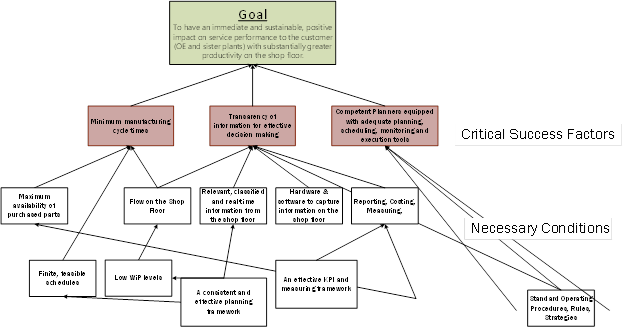In the following, we’ll discuss part 3 of the series on
getting value out of your ERP system. Once you clearly stated the problem and
carried out a thorough and useful analysis, you should then clearly define your
goals and the desired effects you’d like to get out of a rather expensive ERP
system, that looked so promising when you purchased it.
To develop a roadmap with all the activities necessary to
achieve better results, we must first define what those results are supposed to
be. A very systemic and logical approach to define quality results is William H
Dettmer’s ‘Logical Thinking Process’. With it, Dettmer suggest defining a goal
tree with critical success factors and necessary conditions.
A goal tree provides clarity about necessary conditions which
must be fulfilled to use critical success factors to achieve the goal. It’s
really worthwhile to spend a good amount of time defining the goal tree, as it
serves the basis for the determination of the root causes for undesired
effects.
Dettmer suggests listing the undesired effects with their
causalities and then building a tree with an ‘IF… Then’ structure from the top
down. As an example: one of the undesired effects is that we have high
inventory of purchased parts, but still many stock-outs. One of the causes for
that situation is that our suppliers don’t deliver what we need when we need
it. This in turn can be caused by the fact that we plan exclusively
deterministic and therefore order the wrong quantities too late. Another
additive cause could be that we’re not planning, but only react to what we need
right now.
Knowing now the causality tree, you can find and identify
critical root causes. These critical root causes are then used to develop the
Future Reality Tree.
In the FRT you go from the bottom up and use Injections
(solutions) to break the negative causalities and turn undesired effects into
desired effects.
If you do this using system thinking and logical
causalities, you will be rewarded with a very clear picture about what needs to
be done in order to achieve your goals. I find this extremely helpful in our
optimization projects as it lays out a plan that you can use to define your
road map, monitor your progress and measure your results.
In below graphic you can also see that the Future Reality
Tree also shows those real effective reinforcing loops that are essential for
sustainable success.
The approach which we’re discussing here requires time,
effort and discipline. It’s not complicated but requires attention and focus.
It is very contrary to the ‘band aid’ and ‘work-around’ problem fixing which so
many apply. Dettmer’s Logical Thinking Process stems from and combines parts
from the Theory Of Constraints and, maybe even more important, Systems Thinking
and causal loops. These are thinking and problem-solving techniques which look
at the Big Picture and strive to solve problems holistically, considering and
avoiding unintended consequences.
Getting Value and Results out of an ERP 1
Getting Value and Results out of an ERP 2
Getting Value and Results out of an ERP 4
Getting Value and Results out of an ERP 5




No comments:
Post a Comment
Note: Only a member of this blog may post a comment.